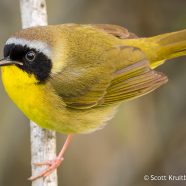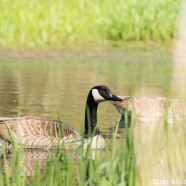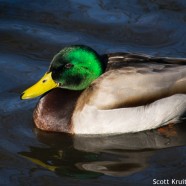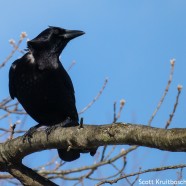Common Yellowthroat
This male Common Yellowthroat (Geothlypis trichas) and I are rather close…or at least we were for about 30 seconds on a recent May morning. This bird is a migrant, though you may end up with a resident in a yard near you. Their common name does betray their abundance, and gardens, marshes, fields, forests or anywhere they can skulk about in dense, low vegetation works for them. Being a habitat generalist has helped the species end up as one of our most common warblers. It also makes them a frequent target of Brown-headed Cowbirds and brood parasitism, like the abundant Yellow Warbler....
Read MoreCanada Goose Pair
There is no more common and known waterfowl species than the Canada Goose (Branta canadensis) for most of us year-round, but even this bird, seen as a pest by some as they soil parks and cover golf courses, must live and breed. This is a pair at a local pond that was likely about to nest. They really have a handsome look to them, if you stop to take it in…and I appreciate them! Scott Kruitbosch Conservation & Outreach Coordinator
Read MoreDrake Mallard
Sometimes you have to stop and appreciate the “classics” – or more specifically, a bird like the very common Mallard duck. The drake has a stunning appearance, with its gorgeous plumage often being overlooked because people (like me) see so very many of them. Here’s to them! Scott Kruitbosch Conservation & Outreach Coordinator
Read MoreAmerican Crow (Corvus brachyrhynchos)
The American Crow (Corvus brachyrhynchos) is one of those birds that are so well known to nearly everyone that we rarely stop to take the time to view them properly. Thankfully they are more common now in the east than they had been as the initial part of the 21st century saw significant losses to even this abundant species thanks to the West Nile Virus. Areas that were richer in species diversity saw fewer losses due to the virus, likely signaling the strength of a healthy ecosystem to battle a pathogen. Conservation needs to focus on certain species at times – as we at RTPI often do...
Read More







